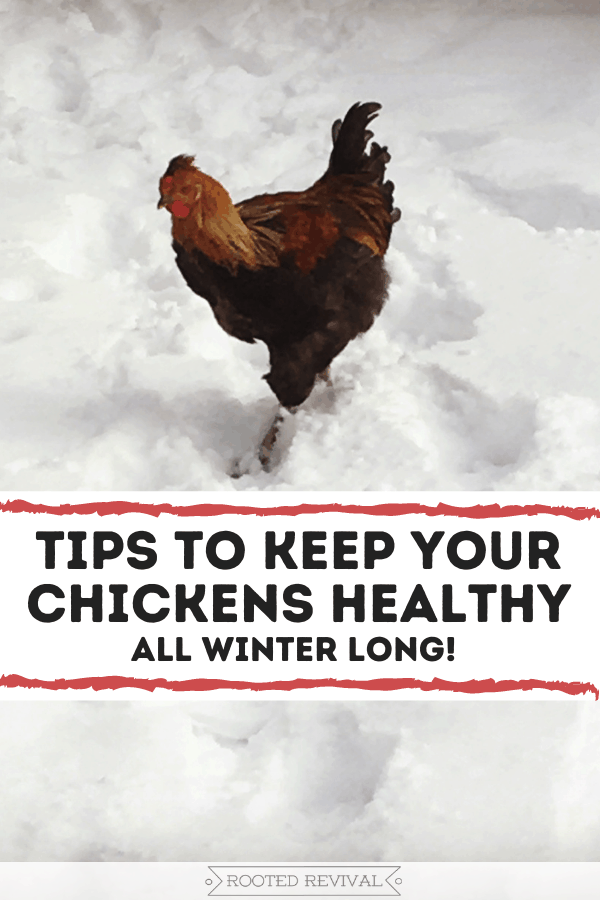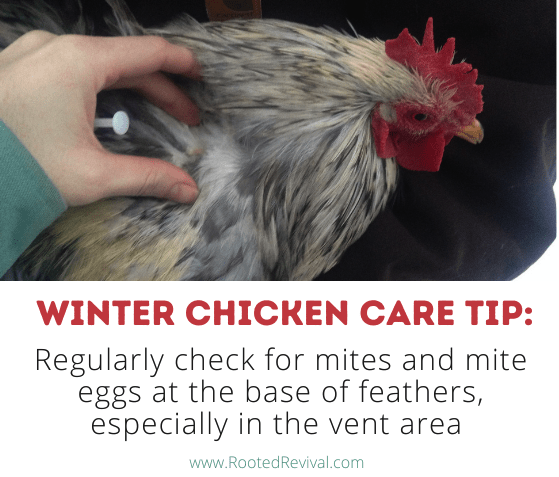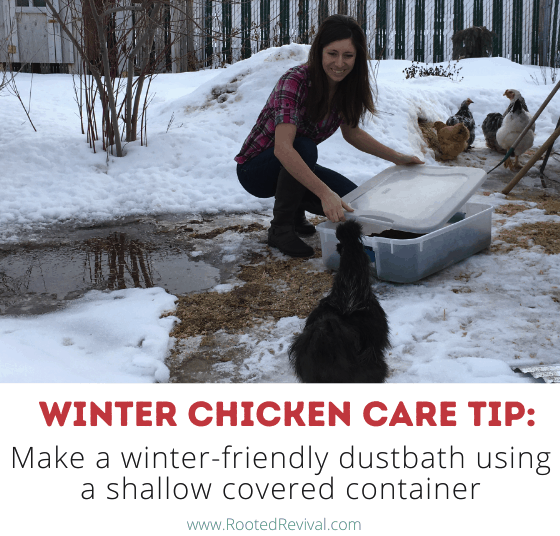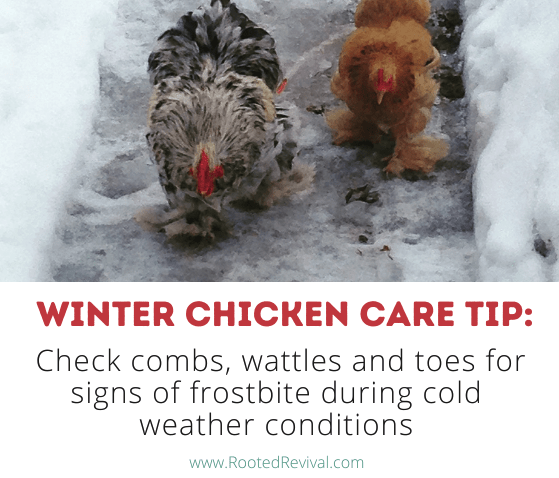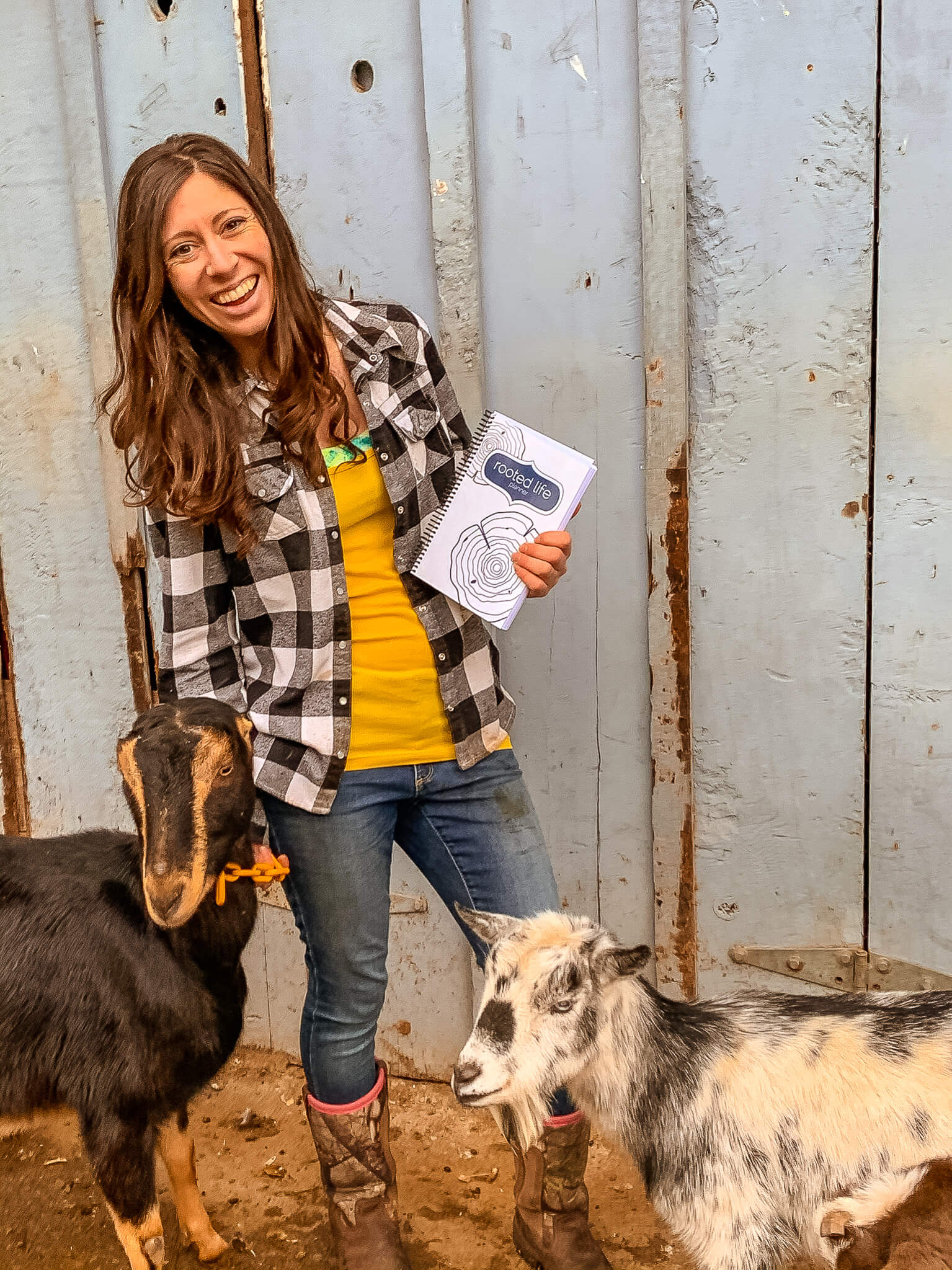These chicken health tips will help keep your flock healthy all winter! Learn how to check your flock for illnesses, avoid frostbite and more!
Holy snow!
I imagine that if my chickens could choose, they would be pecking around some beach somewhere, terrorizing the tourists for treats, and pooping in someone’s tropical drink.
Instead, they are stuck here in Idaho with me. In the snow… so much snow! We commonly get snow here in the high desert. But we usually don’t get it all at the same time! So my chickens and I are working hard to adapt to this crazy winter weather!
Preparing for all the possibilities that winter can bring is an important part of homesteading and animal care. While we can never be 100% prepared for the surprises that Mother Nature brings, we can take small steps to ensure that our chickens and other livestock stayed healthy and happy during the ongoing storms.
I’ve created this 4 part mini-series to share aaaalllll of my tips and tricks to keep your backyard chickens happy and healthy this winter!
Today’s post is all about how to keep your chickens healthy during winter storms and cold-snaps! So we will be chatting about how to check for common winter ailments, like mites and frostbite. We will also discuss some preventative steps you can take to keep your flock healthy.
And, be sure to check out the other posts in the Winter Chicken Care series, too!
- How to Prepare your Chicken Coop for Winter
- Ideas to Keep your Chickens Entertained this Winter
- How to Care for Chickens in Winter: Nutrition & Feeding Tips
**This post contains affiliate links for awesome products. We may receive a commission at no expense to you if you choose to purchase items using these links. See our full affiliate disclosure here. Thanks for helping support this blog! **
Winter Chicken Health Tip #1: Perform regular health checks on your chickens
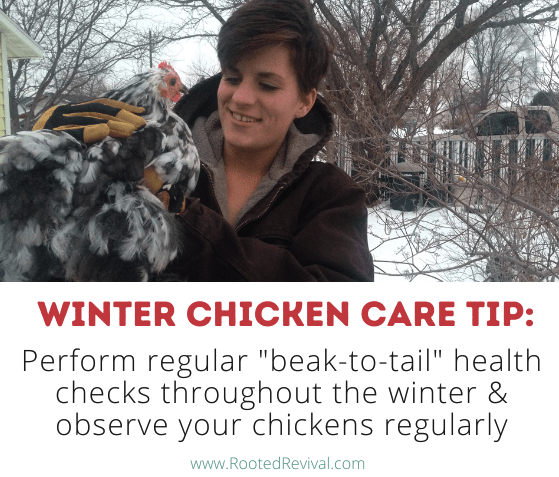
During the winter, it’s tempting to spend as little time as possible outside with the chickens… because BRRRRR!
But it is very important to get out there and spend some quality time with your flock, even in the winter! This will allow you to notice changes in behavior, attitude, physical appearance and appetite – all of which can be signs of illness.
Just like people, it is easy for chickens to become susceptible to illnesses during winter months when the cold and snow impedes their normal food supply and lifestyle. Early detection is the best option for treating illnesses successfully.
In addition to watching for signs of appetite and behavior changes, I regularly examine my chickens during the winter months. I perform a “Beak to Tail” examination by beginning at one end of the chicken and working my way down the chicken, examining each body area as I go. I begin by checking the chicken’s head, eyes, face, comb and beak. Then, I work my way down the chicken towards the tail, observing skin, feathers, feet, vent and overall body composition.
Regular examinations will help you catch injuries and illnesses sooner. Plus, you will also become more familiar with your birds!
Understanding what is “normal” versus “abnormal” can really vary bird to bird. So regular examination will allow you to better understand each bird’s unique features and behaviors. This is one “ounce of prevention” that is absolutely worth the time involved!
Winter Chicken Health Tip #2: Keep checking for mites!
Believe it or not, these little blood-thirsty vampire pests can still be hanging out on your chickens even during the cold winter months! I know, it’s completely ridiculous, right?!
The Northern Fowl Mite is actually more prevalent during colder months than in the heat of the summer! Mites take up residence on your chickens and feed on their blood. They especially love living in the vent area, which has the perfect temps and humidity for them to survive.
This winter, I learned the hard way how important it is to closely check my chickens for mites and mite eggs!
We noticed one of our newer chickens (who was given to us by a desperate acquaintance who was moving to the city) was looking a little rough. During one of their regular health checks, we discovered that these two new chickens came with some hitchhiking mites! Luckily, we were able to treat them before the mites affected our other chickens, but we certainly learned what a serious pain in the you-know-what mites can be!
You can take steps to prevent your chickens from becoming bug-infested over the winter by reducing the addition of new birds to your flock, limiting interaction with wild birds, providing dust baths, and making sure coops are kept mouse, wild bird and rat-free.
Winter Chicken Health Tip #3: Provide dust baths when the ground is frozen & covered in snow
As noted above, dust baths can be beneficial in helping your chicken stay clean and mite-free over the winter months.
During the summer, our chickens have a natural dust bath areas all over the property! Unfortunately though, during the winter, those areas of dirt are either covered with snow, pits of mud or frozen solid! This makes essential to provide a man-made dustbath for our chickens.
You can easily make a dustbath by mixing dirt, natural sand, and a little wood ash together in a container that is large enough for the chickens to bathe in. We use a large, shallow tupperware with a lid so that we can easily move and cover it during rain and snow storms. This keeps the dust bath dry and chicken-ready at all times!
Winter Chicken Health Tip #4: Check for frostbite when temps drop
Frostbite is caused from cold, moist conditions. Sadly, frostbite is very common among chickens during the winter months. It usually affects the comb, feet or wattles of chickens.
Keeping your chickens’ environment dry and well-ventilated is your best defense to frostbite! However, frostbite can still occur, even for the most careful of chicken owners.
Discolored tissue, blisters, and limping can all be signs of frostbite. If you notice a chicken with frostbit tissue, monitor the chicken carefully for signs of distress and consult a veterinary professional, if possible.
Depending on the severity, moving the chicken to a warm, indoor area may be necessary. Do not touch, warm, or apply creams/lotions directly to newly frost-bitten areas, unless directed to do so by a veterinary professional.
We check our chickens regularly for frostbite and provide a dry, well-ventilated coop to protect them from wind, rain, snow and extreme temperatures. However, our rooster still managed to develop mild frostbite on his wattles!
Sadly, frostbit wattles aren’t terribly uncommon. This can easily occur when the wattles become wet from drinking water or when water drips from the beak onto the wattles.
Luckily, our rooster’s frostbite is very mild. We are checking on him everyday to make sure the area doesn’t become infected. Once we see the tissue start to heal in a couple of weeks, we will begin applying all-natural Green Goo to help the tissue regenerate and to soothe the area (Green Goo is a serious life-saver with chickens and livestock!).
Be sure to check out the other posts in the Winter Chicken Care series, too!
- How to Prepare your Chicken Coop for Winter
- Ideas to Keep your Chickens Entertained this Winter
- How to Care for Chickens in Winter: Nutrition & Feeding Tips
If you like it then you better put a pin on it!
